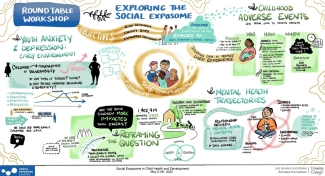The Social Exposome Cluster influences policies and practices that address health disparities by bringing together experts and data across disciplines to uncover the relationships among the cellular, environmental, and social factors that impact health and well-being across the lifecourse.
To achieve this, we take a “society to cell” approach by exploring the social exposome, the cumulative social exposures over the life-course that influence development and health from conception into older age.
The cluster facilitates the collaboration between researchers, health care practitioners, trainees, and knowledge users to examine the social and environmental factors (and interactions amongst factors) that have lasting impacts on health and well-being and the biological processes in the body by which they do so (referred to as “biological embedding”). The ultimate goal is to use this knowledge to develop and implement policies and interventions to reduce disparities and optimize health and well-being for all people in Canada and abroad.
Grand Challenge
In UNICEF’s recent Report Card that assessed child well-being, Canada ranked only 30 out of 38 high income countries. Despite being the 5th most prosperous country in the world, Canada’s rankings were alarmingly low on key measures of children’s health and safety, as well as child poverty.
These conditions have resulted in large and growing inequalities in the development and health of Canadians. For example, using standard measures, children from low-income neighbourhoods are more vulnerable on key areas of development than those from high-income neighbourhoods. In addition, children with chronic diseases, like asthma, who are from low income neighbourhoods are admitted to the hospital more frequently. This impact of living conditions on health and wellbeing is referred to as the social determinants of health, and when experienced during development, has life-long implications for the risk of developing chronic diseases and mental illnesses. It is crucial that we understand the specific factors leading to these inequalities in order to devise policies and interventions to reduce them.

Approach
The overall goal of the cluster is to harness information about the social exposome in order to develop policies and interventions to reduce disparities in child health and development.
This will be achieved by:
- The development of new interdisciplinary and inter-sectoral collaborations and partnerships to develop new research projects and directions related to the clusters themes
- A focus on effective knowledge translation to key stake holders by engaging experts in policy and members of relevant community and government groups to disseminate the progress of the cluster and to identify priorities and opportunities
- A commitment to training and education of the next generation of researchers and health care practitioners by involving trainees in all activities of the cluster and creating opportunities for learning and professional development.
